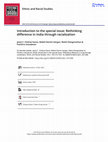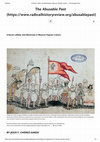Papers by Jesús F. Cháirez-Garza
South Asia: Journal of South Asian Studies, 2024
This article shows how untouchability was framed as an ethnographic problem largely through a rac... more This article shows how untouchability was framed as an ethnographic problem largely through a racial and Brahmanical perspective by looking at some of the main interventions made by British and Indian social scientists on this topic, such as H.H. Risley, G.S. Ghurye and Radhakamal Mukerjee. Dalit traditions, knowledge and theories about their origin were discarded and suffered an epistemicide. Reassessing the history of untouchability as an ethnographic concept is critical as the influence of these theories can still be perceived not only in common understandings about the origin of Dalits but also in the way sociology and anthropology are practised in India.

Transactions of the Royal Historical Society, 2024
Recently, there has been a growing discussion concerning the way historians should approach the s... more Recently, there has been a growing discussion concerning the way historians should approach the study of Indian revolutionaries both within and outside the subcontinent. Described as 'the revolutionary turn', this area of research has not only explored the porosity and ambiguity in defining individuals as revolutionaries but has also questioned the way such revolutionaries sought to write themselves into history as a political act. Continuing this line of interrogation, this article examines the retrospective political claims of heroic revolutionary belonging by analysing the autobiographical notes left by Pandurang Khankhoje, a peripatetic Indian who left his country pursuing dreams of revolution. While in the last decade Khankhoje has become an iconic character in writing histories about global solidarities and anti-colonial resistance, this article asks to what extent can historians believe self-described revolutionary narratives. As this article shows, these narratives privilege what Pierre Bourdieu has called 'biographical illusion', the organisation of life as a history that unfolds coherently and chronologically from beginning to end. Political or ideological differences and inconsistencies are flattened in the name of global ideologies or solidarities. As an attempt to disrupt these narratives, this article will focus on the silences, absences and 'unreliability' of the experiences and sources used to understand the work and lives of Indian revolutionaries abroad, such as Khankhoje, Lala Har Dayal and M. N. Roy. This article argues that the story of revolutionaries reveals important details about how they understood the racial, political and gender structures of different societies in the early twentieth century.

Ethnic and Racial Studies, 2021
The contributions in this issue forward a nuanced exposition of how the production of racial diff... more The contributions in this issue forward a nuanced exposition of how the production of racial difference in India buttresses and is reproduced through Hindu nationalist, casteist, and colonial projects that generate tacit or explicit consent for continued violence against racialized others. At the same time, the articles look transnationally, examining how regional forms of racial difference marked by caste and tribe, for instance, have long articulated with historical forms of global racial capitalism. Ultimately, this special issue attends to the narratives and experiences of those living at the margins, who strategically deploy racial concepts to build international solidarity movements beyond the narrow confines of the nation-state. In so doing, it hopes to derive insights on the necessity of transnational translations, even as it directs renewed attention to the specificity of regional hierarchies that shape everyday life and death in India.
South Asia: Journal of South Asian Studies, 2018
This paper analyses Ambedkar's challenge to racial theories of untouchability. It examines how Fr... more This paper analyses Ambedkar's challenge to racial theories of untouchability. It examines how Franz Boas' ideas about race, via Alexander Goldenweiser, influenced Ambedkar's political thought. Ambedkar is situated as a thinker aware of larger changes taking place in Western academia in the early twentieth century. During his time at Columbia University, Ambedkar familiarised himself with ideas that rejected the fixity of identities and racial hierarchies. Ambedkar, following Boas, rejected the idea that Untouchables's place in society was determined by their supposed racial inferiority. Instead, he argued that untouchability was a cultural problem that could be fought and eradicated.

The Indian Economic & Social History Review, 2018
This article examines B. R. Ambedkar’s dramatically shifting politics in the years prior to Parti... more This article examines B. R. Ambedkar’s dramatically shifting politics in the years prior to Partition. In 1940, he supported the creation of Pakistan. In 1946, he joined Winston Churchill in his demands to delay independence. Yet, in 1947, Ambedkar rejected Pakistan and joined the Nehru administration. Traditional narratives explain these changes as part of Ambedkar’s political pragmatism. It is believed that such pragmatism, along with Gandhi’s good faith, helped Ambedkar to secure a place in Nehru’s Cabinet. In contrast, I argue that Ambedkar changed his attitude towards Congress due to the political transformations elicited by Partition. Ambedkar approached Congress as a last resort to maintain a political space for Dalits in independent India. This, however, was unsuccessful. Partition not only saw the birth of two countries but also virtually eliminated the histories of resistance of political minorities that did not fall under the Hindu–Muslim binary, such as Dalits. In the ca...
South Asia: Journal of South Asian Studies, 2019
This article analyses the way in which B.R. Ambedkar attempted to internationalise the problem of... more This article analyses the way in which B.R. Ambedkar attempted to internationalise the problem of untouchability in the years prior to Partition. The move towards the international was an attempt to secure a political space for Dalits as a consequence of the Muslim League's demand for Pakistan. Unable to reach an agreement with the likes of Gandhi and Jinnah, Ambedkar looked beyond India for support. His plight gained the attention of disparate people including Winston Churchill, Jan Smuts and the members of the Indian Conciliation Group. By exploring these events, this article seeks to rescale the history of untouchability and Partition.

Ethnic and Racial Studies
This paper analyses the complex nature of untouchability by examining its connections to space an... more This paper analyses the complex nature of untouchability by examining its connections to space and racialization in Ambedkar’s political writings, including his experiences of using movement through space as a counter-hegemonic strategy. For Ambedkar, untouchability rested on a perpetual threat of violence which pushed Dalits to ‘self-racialize’ or adopt bodily markers which gave away their caste status in specific places. This permitted the organization of castes hierarchies in space and its constant reproduction through time. Ambedkar became aware that places like the village facilitated the racialization of certain bodies as touchable or untouchable. Yet, the connections between space and racialization were not fixed. Ambedkar’s memories of untouchability were linked to ‘in-between spaces’, such as train stations or hotels, where the racialization of Dalits could not be assumed a priori. Such spatial indeterminacy allowed Ambedkar to challenge the behaviour Dalits were supposed to conform to in dominant caste spaces.

The Abusable Past - Radical History Review, 2020
Content warning: This text makes reference to racist stereotypes. While the images are not visibl... more Content warning: This text makes reference to racist stereotypes. While the images are not visible here, there are hyperlinks to some of the images, which are offensive in nature.
The murder of George Floyd and the recent protests in the US surrounding the Black Lives Matter movement have produced a ripple effect throughout the world. Many countries across Latin America, Mexico included, have shown their support to the cause. However, while signs of solidarity are always welcomed, these events have illustrated once again that a majority of Mexicans seem more comfortable supporting anti-racist fights when they occur beyond its own borders. In other words, Mexico thinks of anti-Blackness as a foreign problem that does not relate to its political and social history. But is this really the case? The answer is a hard no and this issue is particularly visible if one takes a look to Mexican popular culture.
South Asia: Journal of South Asian Studies, 2019
This article analyses the way in which B.R. Ambedkar attempted to internationalise the problem of... more This article analyses the way in which B.R. Ambedkar attempted to internationalise the problem of untouchability in the years prior to Partition. The move towards the international was an attempt to secure a political space for Dalits as a consequence of the Muslim League’s demand for Pakistan. Unable to reach an agreement with the likes of Gandhi and Jinnah, Ambedkar looked beyond India for support. His plight gained the attention of disparate people including Winston Churchill, Jan Smuts and the members of the Indian Conciliation Group. By exploring these events, this article seeks to re-scale the history of untouchability and Partition.
South Asia: Journal of South Asian Studies, 2018
This paper analyses Ambedkar’s challenge to racial theories of untouchability. It examines how Fr... more This paper analyses Ambedkar’s challenge to racial theories of untouchability. It examines how Franz Boas’ ideas about race, via Alexander Goldenweiser, influenced Ambedkar’s political thought. Ambedkar is situated as a thinker aware of larger changes taking place in Western academia in the early twentieth century. During his time at Columbia University, Ambedkar familiarised himself with ideas that rejected the fixity of identities and racial hierarchies. Ambedkar, following Boas, rejected the idea that Untouchables’s place in society was determined by their supposed racial inferiority. Instead, he argued that untouchability was a cultural problem that could be fought and eradicated.

The Indian Economic and Social History Review
This paper examines B.R. Ambedkar’s dramatically shifting politics in the years prior to Partitio... more This paper examines B.R. Ambedkar’s dramatically shifting politics in the years prior to Partition. In 1940, he supported the creation of Pakistan. In 1946, he joined Winston Churchill in his demands to delay independence. Yet, in 1947, Ambedkar rejected Pakistan and joined the Nehru administration. Traditional narratives explain these changes as part of Ambedkar’s political pragmatism. It is believed that such pragmatism, along with Gandhi’s good faith, helped Ambedkar to secure a place in Nehru’s Cabinet. In contrast, I argue that Ambedkar changed his attitude towards Congress due to the political transformations elicited by Partition. Ambedkar approached Congress as a last resort to maintain a political space for Dalits in independent India. This, however, was unsuccessful. Partition not only saw the birth of two countries but also virtually eliminated the histories of resistance of political minorities that did not fall under the Hindu-Muslim binary, such as Dalits. In the case of Ambedkar, his past as a critic of Gandhi and Congress was erased in favour of the more palatable image of him as the father of the constitution. This essay reconfigures our understanding of Partition by showing how the promise of Pakistan shaped the way we remember Ambedkar.
Nationalizing untouchability: The political thought of B.R. Ambedkar, ca.

Although B.R. Ambedkar, the chief architect of the Indian Constitution, is well known for his str... more Although B.R. Ambedkar, the chief architect of the Indian Constitution, is well known for his struggle against caste and the practice of untouchability, his ideas have seldom been linked to concepts such as nationalism or space. In an attempt to shed some light upon this under-explored subject, I analyse the relationship between the village, the city, the practice of untouchability and the emergence of nationalism in Ambedkar’s thought. Focusing primarily on his writings, post 1935 concerning
untouchability, I will argue that for Ambedkar, space played a critical role in both the perpetuation and evanescence of untouchability and similarly in the neglect and emergence of nationalism. More specifically, a small locus with tightly knit social and commercial associations, such as the Indian village, facilitated the ongoing differentiation of the population into two distinct groups, touchables and Untouchables. This social and spatial segregation perpetuated the practice of untouchability while preventing the growth of nationalism. However, a bigger and
more crowded setting, such as the city, not only complicated the observance of social norms such as untouchability, but also benefited the creation of a corporate feeling of ‘oneness’ among individuals, which according to Ambedkar, was a condition for the
emergence of nationalism.
Estudios de Asia y Africa, Jan 1, 2009
JSTOR is a not-for-profit service that helps scholars, researchers, and students discover, use, a... more JSTOR is a not-for-profit service that helps scholars, researchers, and students discover, use, and build upon a wide range of content in a trusted digital archive. We use information technology and tools to increase productivity and facilitate new forms of scholarship. For more information about JSTOR, please contact support@jstor.org.
Talks by Jesús F. Cháirez-Garza
Other by Jesús F. Cháirez-Garza
Hacial El Sur, 2020
This short paper discusses some of the historical context of the movie 'I am no longer here' dire... more This short paper discusses some of the historical context of the movie 'I am no longer here' directed by Fernando Frías. It analyses the importance of Kolombian music and culture in Monterrey, N.L., México. I argue that Kolombianos were not a marginal urban tribe but a well entrenched cultural movement in the city.
https://chairezgarza.wordpress.com/2020/06/07/a-non-regio-guide-for-i-am-no-longer-here/
Conference Presentations by Jesús F. Cháirez-Garza
Rethinking Difference - Conference - April 1 and 2, American University, DC.
Drafts by Jesús F. Cháirez-Garza

Ambedkar in London, 2023
This chapter analyses the early attempts of B.R. Ambedkar to internationalise the problem of unto... more This chapter analyses the early attempts of B.R. Ambedkar to internationalise the problem of untouchability by looking at his participation in the first session of the Indian Round Table Conference held in London during the winter months of late 1930 and early 1931. The Round Table Conference [RTC hereafter] were a series of encounters, over three years, between Indian and British politicians to discuss the future constitutional structure of this colony, including aspects such as federalism, the distribution of political representation and the division of powers between the central government and the provinces. Of course, while the RTCs were not strictly international events due to the imperial entanglement between Britain and India, I will argue that Ambedkar used these gatherings as a stage to present the plight of Dalits to an international audience beyond the subcontinent. In particular, Ambedkar used the political structures and technologies in place to sustain London as an imperial capital and centre of power to move the question of untouchability from being considered a socio-religious issue into a political question. Such structures secured Ambedkar’s status as an ‘All-India’ political leader and permitted him to present his ideas to the international press, particularly newspapers based in the US.









Uploads
Papers by Jesús F. Cháirez-Garza
The murder of George Floyd and the recent protests in the US surrounding the Black Lives Matter movement have produced a ripple effect throughout the world. Many countries across Latin America, Mexico included, have shown their support to the cause. However, while signs of solidarity are always welcomed, these events have illustrated once again that a majority of Mexicans seem more comfortable supporting anti-racist fights when they occur beyond its own borders. In other words, Mexico thinks of anti-Blackness as a foreign problem that does not relate to its political and social history. But is this really the case? The answer is a hard no and this issue is particularly visible if one takes a look to Mexican popular culture.
untouchability, I will argue that for Ambedkar, space played a critical role in both the perpetuation and evanescence of untouchability and similarly in the neglect and emergence of nationalism. More specifically, a small locus with tightly knit social and commercial associations, such as the Indian village, facilitated the ongoing differentiation of the population into two distinct groups, touchables and Untouchables. This social and spatial segregation perpetuated the practice of untouchability while preventing the growth of nationalism. However, a bigger and
more crowded setting, such as the city, not only complicated the observance of social norms such as untouchability, but also benefited the creation of a corporate feeling of ‘oneness’ among individuals, which according to Ambedkar, was a condition for the
emergence of nationalism.
Talks by Jesús F. Cháirez-Garza
Other by Jesús F. Cháirez-Garza
https://chairezgarza.wordpress.com/2020/06/07/a-non-regio-guide-for-i-am-no-longer-here/
Conference Presentations by Jesús F. Cháirez-Garza
Drafts by Jesús F. Cháirez-Garza
The murder of George Floyd and the recent protests in the US surrounding the Black Lives Matter movement have produced a ripple effect throughout the world. Many countries across Latin America, Mexico included, have shown their support to the cause. However, while signs of solidarity are always welcomed, these events have illustrated once again that a majority of Mexicans seem more comfortable supporting anti-racist fights when they occur beyond its own borders. In other words, Mexico thinks of anti-Blackness as a foreign problem that does not relate to its political and social history. But is this really the case? The answer is a hard no and this issue is particularly visible if one takes a look to Mexican popular culture.
untouchability, I will argue that for Ambedkar, space played a critical role in both the perpetuation and evanescence of untouchability and similarly in the neglect and emergence of nationalism. More specifically, a small locus with tightly knit social and commercial associations, such as the Indian village, facilitated the ongoing differentiation of the population into two distinct groups, touchables and Untouchables. This social and spatial segregation perpetuated the practice of untouchability while preventing the growth of nationalism. However, a bigger and
more crowded setting, such as the city, not only complicated the observance of social norms such as untouchability, but also benefited the creation of a corporate feeling of ‘oneness’ among individuals, which according to Ambedkar, was a condition for the
emergence of nationalism.
https://chairezgarza.wordpress.com/2020/06/07/a-non-regio-guide-for-i-am-no-longer-here/